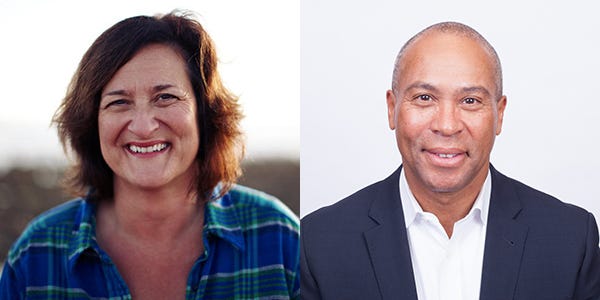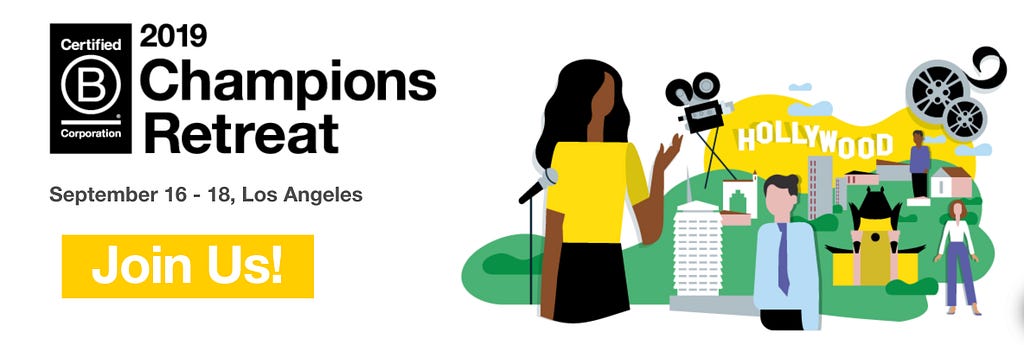Bain Capital Double Impact’s Deval Patrick and Patagonia’s Rose Marcario Share How Business Can Build an Inclusive and Regenerative Economy

To bring about the inclusive and regenerative economy that Certified B Corporations envision will require active participation from business leaders — and policymakers, advocates and customers also must play a role.
Through systems modeled after the natural world that create net benefit rather than harm, B Corps and other future-minded organizations work year over year to move their operations toward having a positive impact on the planet and their communities and benefit all people, including their workers and customers. Shifting to a more inclusive and regenerative model requires innovative practices and nimble operations that can adapt to and shape the B Economy.
We spoke with former Massachusetts Gov. Deval Patrick, currently Co-Managing Partner of Bain Capital Double Impact (Bain Capital’s impact investing strategy), and Rose Marcario, CEO of B Corp Patagonia, about the ways business and finance can achieve change, who else needs to get in the game, and why there’s reason to be hopeful.
Both Patrick and Marcario will be on the main stage as keynote speakers at the 2019 Champions Retreat, the annual gathering of the B Corp community.

What does the B Corp movement offer in reshaping the way we do business and providing for the future of business?
Marcario: We’re living in a world where business is responsible for more than 60 percent of the pollution of our air and our water and our land, and yet businesses take very little responsibility. I think what the B Corp community does is brings together these like-minded companies to be a greater force for good in the world. …This idea that business is somehow bifurcated from the rest of life, it has no responsibility to the environment, it has no responsibility to social good is total bullshit. It’s a totally outdated way of thinking about the world. It’s one of the things that really gives me hope about this movement, because not only does it provide a legal structure, which didn’t exist before … but it also provides a community and a legitimate certification process.
Community is a huge part of the benefit corporation movement because we’ll create a lot of traction around these issues that have just been so fundamental to our businesses. Kim [Jordan, co-founder of New Belgium Brewing] was running her business like that long before there was a structure. Yvon [Chouinard, founder] was running Patagonia this way long before the [benefit corporation] structure existed. The structure gives us an organizing movement, which I think is really important.
What changes does the finance sector need to make to support a transition to an inclusive, regenerative economy?
Patrick: Long-term value is impossible without paying attention to people and planet. Companies that pay attention to both are typically better businesses by every social, environmental and financial measure. I think the financial sector is coming around to that realization, but there is more work to do to convince companies and their investors that focusing on the full consequences of their choices, not just next quarter’s financial returns, “pays off” in every sense of the term.
How do you envision the private and public sector working together to move us toward a better future?
Patrick: In my experience, in much of the rest of the world the line between the public and the private sectors is a lot less bright. Collaboration is common, and just as in other settings frequently produces better results. It is critical for the public and private sectors to work together and to learn from each other.
The public sector can enact policies that pave the way for the private sector to be more creative in addressing social challenges and can also provide a safety net for people who need support in the meantime. The public sector can also support early-stage research and other initiatives that can then be commercialized by the private sector for underserved communities or for broader benefit.
What role does corporate activism play in creating broader changes?
Marcario: Activism has always been really important to Patagonia, partly because very few people fund grassroots environmental activism. The corporate funding that goes to environmental activism is only about 3 percent. Funding grassroots activism has always been important to the company … because activism will move the meter. It’ll force the legislators, it will force the municipalities to pay attention to what it means to people, individual people, around concerns about climate.
The B Corp structure has been great because it’s allowed our founders to really institutionalize philanthropy into our charter, which I think is really important. One percent of sales, not profits — so even if we don’t have a profitable year — that 1 percent of sales is still going to go to grassroots activism. I’m talking about small grants, $10,000 to $20,000. I’m talking about the people that are standing in front of bulldozers, that are trying to create fossil fuel infrastructure, that kind of thing.
What do you feel is missing in the conversations about how business can be more inclusive?
Patrick: One thing that’s missing is the realization that companies focused on developing inclusive products and services are necessarily addressing bigger markets than those that are selling to narrow target groups. Many companies overlook the market opportunity that inclusivity presents. We’re also seeing more companies moving toward inclusive practices because their own employees are demanding it.
Why are you optimistic about succeeding in creating a regenerative economy?
Marcario: I would say that I am optimistic because I have seen a few things that have really changed the landscape. One is the ability to interconnect in a way that we’ve never seen before. I haven’t seen the ability to organize and collaborate in the way that I have seen it today. It is amazing, and it is a wonderful leverage. I think it will really change things.
Look, we’re in a crisis. The science is telling us that, and we can make choices, and consumers can make choices, and customers can make choices. I think we need more customers than consumers. We need more citizens than consumers. They can make choices not to buy stuff: not to buy stuff you don’t need, not to buy a T-shirt that’s grown with conventional cotton. That’s a choice you can make, and that will make a difference.
And in agriculture, we’re starting to learn an awful lot about regenerative organic agriculture and how powerful it could be to potentially restore the planet’s health. I think that’s really exciting and hopeful, and I put a lot of emphasis on that. We’re doing that a lot in our food business, and I can see that really taking hold if customers really forced the change. Because the change is only going to come, I think, through customers.
Rose Marcario’s statements were originally made in a live interview at a B the Change event. This article was originally published by B Lab.
B the Change gathers and shares the voices from within the movement of people using business as a force for good and the community of Certified B Corporations. The opinions expressed do not necessarily reflect those of the nonprofit B Lab.

Adapt and Innovate: How Business and Finance Can Lead Positive Change was originally published in B the Change on Medium, where people are continuing the conversation by highlighting and responding to this story.